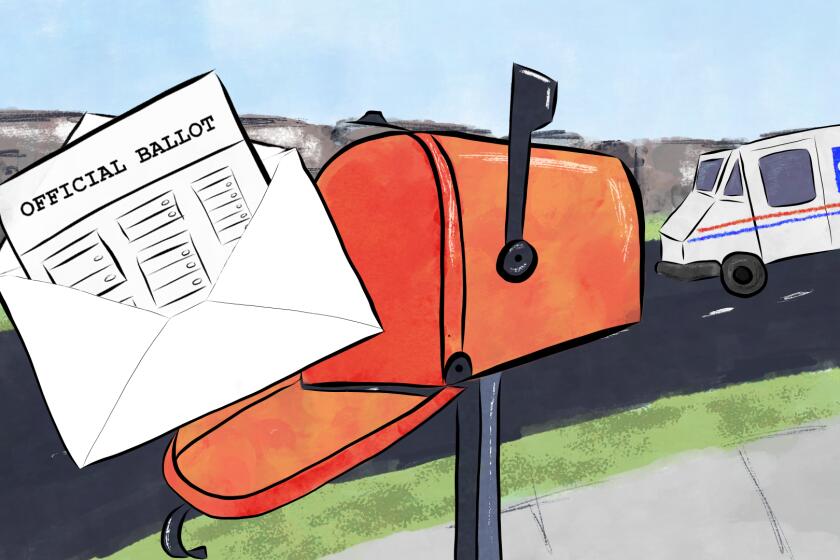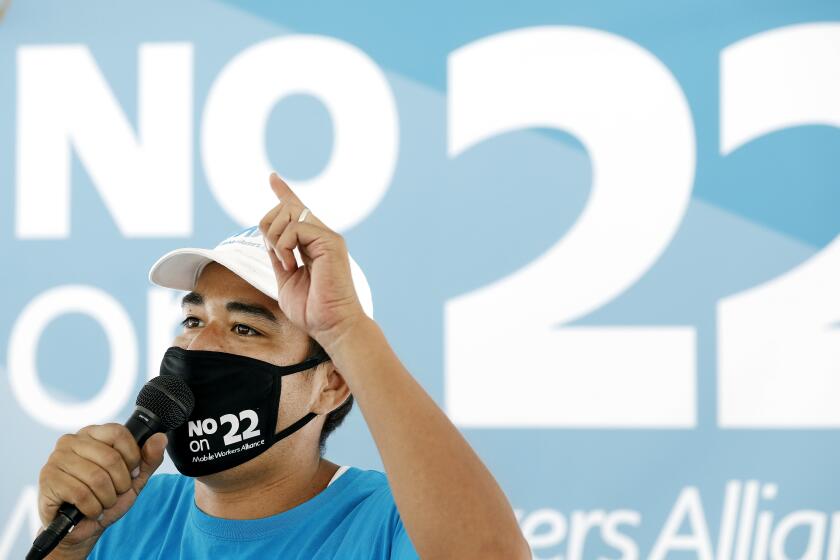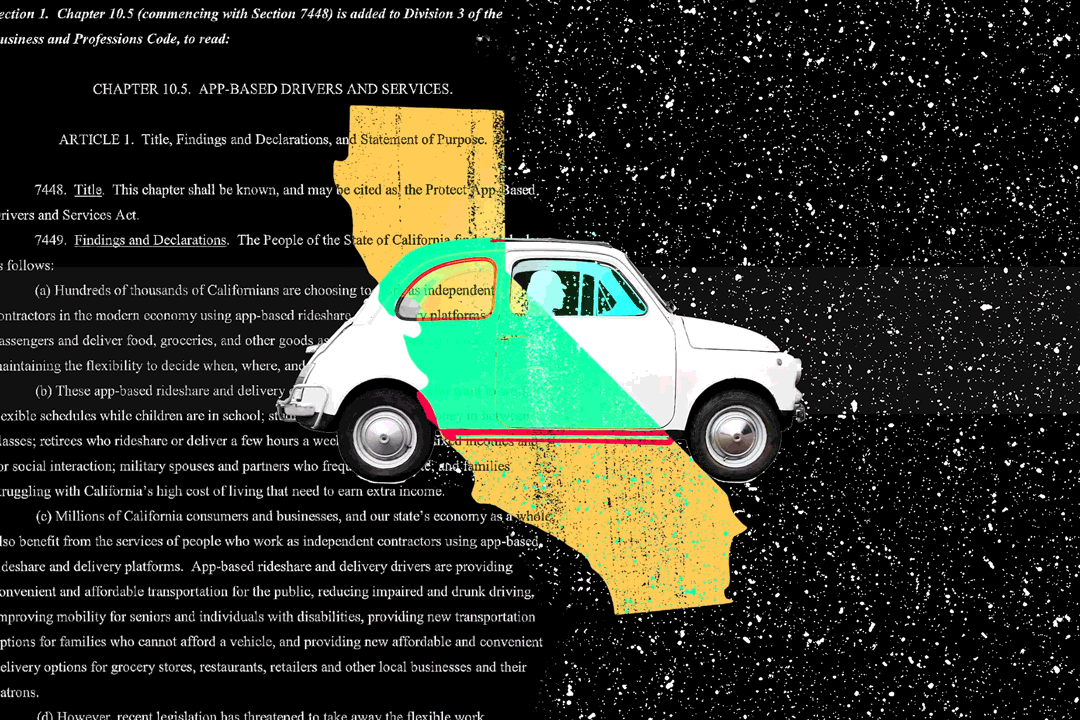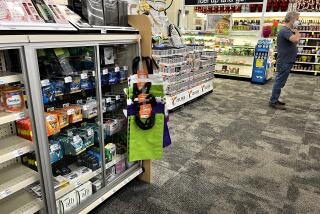Uber, Lyft, DoorDash workers on Prop. 22: ‘I don’t want to end up on the wrong side’
- Share via
In a sprawling lot by Los Angeles International Airport, drivers for ride-hailing companies Uber and Lyft wait for new passengers. Ask them about Proposition 22 — the measure on the California ballot that will determine their worker classification as either independent contractors or employees — and you get a surge of fierce opinions.
Many support the measure. “I’m for Prop. 22 because I am already a full-time employee and [driving] is my second job. I also have six kids and need to pick them up from school and take them to doctors appointments,” one driver said. “I need a flexible schedule.”
Another driver used an expletive to describe Proposition 22, adding that Uber and Lyft “want to keep enslaving drivers. They still control how much you make even if they call you independent.”
Campaigns on both sides of the ballot initiative have put drivers at the center of their messaging.
Opponents’ approximately $16-million campaign, backed by labor groups, argues that workers deserve more pay and benefits.
On the other side, gig-economy companies including Uber, Lyft, DoorDash and Instacart, which together have poured roughly $200 million into promoting Proposition 22, tout surveys that indicate driver support for the measure.
In addition to their public-facing campaign, gig companies have been energetically pressing their own drivers to vote yes and — regardless of the drivers’ feelings on the matter — to push the same message to customers.
Many drivers see passing the measure as a way to keep their current levels of income and autonomy. But others chafe at the flood of pro-Proposition 22 messaging and the role they’re expected to play.
This month, Uber emailed riders and Uber Eats users in California, encouraging them to ask drivers how they felt about Proposition 22. DoorDash dispatched millions of paper bags emblazoned with pro-22 messaging to hundreds of restaurants statewide so workers would deliver meals in them. Instacart drivers assigned to deliver groceries from a store in Berkeley received notifications asking them to pick up and include Yes on 22 stickers in customers’ grocery bags.
“Unbelievable,” tweeted Vanessa Bain, an Instacart shopper and labor activist who opposes the ballot measure. “@Instacart is now requiring Shoppers to do the uncompensated work of distributing Prop 22 propaganda to customers —against our own self-interests.”
A group of Uber drivers in California sued Uber on Thursday for as much as $260 million in damages, alleging that the company violated workers’ rights with a “constant barrage” of pro-Proposition 22 messages, engaging in illegal political coercion by pushing threats in the app about the consequences if the ballot measure fails.
Uber has asked drivers to submit video messages and statements that conform to the company’s political position and respond to surveys regarding their voting preferences, according to the complaint. The company’s “solicitations have the purpose and effect of causing drivers to fear retaliation by Uber if they do not support Uber’s political preference,” the lawsuit reads.
Some drivers were pestered with in-app pop-ups reading “Prop. 22 is progress,” according to a screenshot posted to Twitter. They would have to click “Yes on Prop. 22 or “OK” to move forward with accepting a trip.
Uber called the lawsuit “absurd.”
The complaint was “filed solely for press attention and without regard for the facts. It can’t distract from the truth: that the vast majority of drivers support Prop. 22, and have for months, because they know it will improve their lives and protect the way they prefer to work,” Uber spokesman Davis White said in a statement.
White said it was “absolutely false” that the pop-up notification was shown to drivers for every trip. The pop-up was shown only “occasionally” when drivers went offline, he said, and the language was later changed to read “Get the Facts” instead of “Yes on Prop. 22.”
Building support for a ballot measure that would create a new category of gig work, Uber and Lyft are resorting to a new form of advertising. Even if it passes legal muster, it threatens to turn off some customers.
Instacart declined to comment about the stickers, but it mentioned a statistic frequently cited by the Yes campaign and gig companies.
“Many shoppers and app-based drivers support this measure because they value the flexibility these platforms offer and want to stay independent by a 4:1 margin,” Instacart spokeswoman Natalia Montalvo said in a statement.
This margin is based on a survey conducted by the blog the Rideshare Guy at the end of September, company representatives said. But as some critics have noted, that survey collected responses from a self-selected group of the blog’s readers rather than from a random sampling of drivers — the way a controlled academic study would have.
A series of other polls commissioned by gig companies had similar findings, but Michael Reich, a labor economist at UC Berkeley who has studied Proposition 22, said those polls presented questions disingenuously, saturated with the idea that if the drivers gain employee status, they will lose flexibility — even though the law wouldn’t require that. Companies can give flexibility to employees if they choose to do so.
One reason Proposition 22 is divisive: The stakes are high. If the measure passes, it would cement the drivers’ status as independent contractors, eroding a slate of protections granted by state labor law that requires gig companies to treat their workers as employees.
If the measure fails, DoorDash and Instacart might try to save money by cutting back on the number of workers they use or hours per worker they allow, and Uber and Lyft have threatened to leave California. Many drivers fear the loss of income. (Experts say the ride-hailing companies probably won’t abandon California because the state is a huge market for them, but that isn’t a guarantee.)
Gig companies have poured a historic amount of money into defeating a law to make workers employees. What happens if their effort fails?
“This income allows me to pay my bills, my rent, my car, my car insurance that covers me for ride-share, my medical insurance and part of my stepson’s private university tuition,” said Marck Reyes, a Los Angeles-based shopper and driver for Instacart. “Plus I can take off the days you want without putting together hours to get them.”
Several Lyft and Uber drivers agreed, saying they didn’t want to risk losing what they have.
“I’ve always been my own boss,” said James King, who drives for Lyft and Uber. “Why would I want things to change?”
Flexibility is a key issue for drivers. Six of the eight drivers The Times interviewed at the lot near LAX on Thursday said they were wholeheartedly voting in support of the measure to maintain their current level of freedom in their schedules.
Pablo Gomez, a Lyft driver who lives in La Habra, said he believes that with Uber and Lyft, contractor status really is key to maintaining flexibility. Even though companies can choose to give that same flexibility to employees, Gomez said, “that’s not how the real world works.”
He describes himself as a “reluctant yes” on Proposition 22.
Still, he sees the contradiction. Gomez said the Lyft app doesn’t give him much visibility into or control over the jobs he accepts, and the car he rents from Lyft can’t be used to offer rides via other platforms.
“I am 100% only able to drive with Lyft, so I guess technically how do you make the argument that I’m an independent contractor?” he said. “I’m not, by the true sense of the law.”
Los Angeles-based Instacart shopper Karyn Johnson-Dorsey too said she does not believe the ballot measure offers workers a real choice between being an independent contractor and an employee because they’re not currently afforded true flexibility. But more than that, Johnson-Dorsey wants the protections that come with being an employee.
“I have twisted my ankle on a delivery, caught the virus earlier this year and have been in two auto accidents (both times, someone hit me) and each time I was reminded of my [contractor] status,” she said.
On Thursday, Travis, a driver from San Diego, said he got a call from DoorDash checking to see whether he was going to vote yes on Proposition 22.
“Of course I said, ‘I think I’m going to,’ because I wasn’t going to tell them no,” said Travis, who asked to be identified only by his first name for fear of retaliation.
DoorDash confirmed it was making calls to workers to remind them to vote.
Travis makes his living juggling work for apps including Instacart, Postmates, Grubhub and DoorDash, and he wants to maintain that flexibility. But a recent experience changed his mind. Beginning in September, he said, DoorDash slapped him with a series of citations for “contract violations” for picking up or dropping off food 10 to 15 minutes later than the company’s algorithm determined he should.
If a gig company is willing to squeeze him just weeks before an election where an existential question about their business model is on the ballot, he said, what’s to stop the companies from squeezing workers even harder if the measure passes?
DoorDash spokesman Taylor Bennett declined to provide specifics on how contract violations work; but according to company policy, violating terms of the contract could serve as a valid basis for deactivation from the platform.
Travis said he is thankful the apps exist, and they’ve enabled him to earn money while he’s between jobs. But as it is, he estimates that 80% of his income comes from tips, not from deliveries themselves.
“I feel like we’re moving into this society where we’re having this lower class of worker, and I’m hesitant to vote for something that codifies this underclass,” he said. “I’ve even thought about not voting on this proposition at all, because I don’t want to end up on the wrong side of it.”











